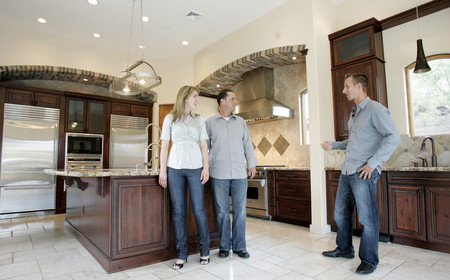Observer says right buyers can stabilize housing market
A key element to recovery for the Las Vegas housing market is making sure that homes are sold to "healthy" buyers, the president of Nevada Association of Realtors said.
Home sales are showing steady growth in Southern Nevada as savvy buyers snap up some of the best deals in 15 years, many of them foreclosures that resulted from the subprime mortgage crisis and ensuing economic recession.
Existing-home sales have increased 68 percent this year to 12,014 through April, while the median price is down 43 percent to $130,000, according to Las Vegas-based Home Builders Research.
There's no way to avoid more foreclosures, but real estate agents can keep things moving in the right direction, said Devin Reiss, Las Vegas Realtor and president of the state organization.
Realtors not only bring the seller and buyer together, they're often the best educational source for an audience that's largely uneducated about the homebuying process, he said.
"The key to understanding the foreclosure crisis in Nevada is the ability to distinguish between a healthy and unhealthy homebuyer," Reiss said. "In order to re-establish homeownership, we have to stabilize the market by avoiding situations with a high risk of foreclosure."
Healthy homebuyers are people with incomes that can support a mortgage, even if it's small, Reiss said. They understand the risks of purchasing a home, including life-changing events that can make mortgage payment difficult, responsibility to pay the mortgage in full and on time, and additional costs and fees associated with homeownership.
Unhealthy homebuyers can support their current lifestyle and a mortgage payment only if no changes occur in their income or expenses, Reiss said. They may not understand their financing options and who they're responsible for paying and how to contact that entity in case of problems.
The National Association of Realtors, in conjunction with its Nevada affiliate, conducted a survey of 500 Nevadans in May as part of its "Face of Foreclosure" project. More than 60 percent of respondents said they had experienced a foreclosure and 24 percent said they had a close relationship with someone in foreclosure.
The study covered many facets of the national foreclosure crisis, including unemployment comparisons, types of loans in foreclosure and the specific nature of foreclosures in Nevada.
About 9 percent of Nevada foreclosures in 2008 were subprime adjustable-rate mortgages, or ARMs, more than double the percentage from the previous year. About 4 percent of foreclosures were prime ARMs and subprime fixed-rate mortgages, while prime fixed-rate mortgage foreclosures rose to 1 percent, the 19-page report said.
Other conclusions from the "Face of Foreclosure" study include:
• The demographics of the foreclosed cover virtually every political, economic, ethnic and educational class.
• Sea-change events occurred in the lives of nearly every Nevada homeowner surveyed, contributing significantly to their foreclosure woes.
• By their own accounts, they are not all victims. Many people take responsibility for getting into loans and homes they could not afford and had no business having.
• Although few, if any, are free from all personal responsibility, there is a clear pattern revealing certain people who seem to have known little to nothing about buying a home, the type of loan they had or the options available to them once foreclosure began.
• No single, conventional causation such as loan type, loss of job or devaluation of property can adequately explain the factors that led to most foreclosures in the study.
Ian Hirsch, operations director for Fortress Credit Services in Las Vegas, said he's constantly asked who's to blame for the mortgage crisis. Is it Congress, the banks, the greedy mortgage brokers and real estate agents or the buyers who signed on the dotted line?
"Obviously, there's plenty of blame to go around," he said. "We could blame everybody, but that's not a good idea. Who does it make sense to forgive? Homeowners. We need to keep people in their homes. This is tearing families apart, taking kids out of school. This has bigger consequences than just a house. That's what I ask my clients. Is this just a house or is this a home?"
Reiss of Nevada Association of Realtors said he's seen too many examples of people buying beyond their means.
"The Realtor is not providing the loan, so they don't ask all the personal finance questions, but they make you aware of the loan itself so you know what to ask your lender and you're not going into it in the dark," he said. "The quicker we can get back on our feet with healthy homebuyers moving into these foreclosed homes, the better off our communities and economy will be."
The full report is available on the Nevada Association of Realtors Web site, www.nvar.org.
Contact reporter Hubble Smith at hsmith@reviewjournal.com or 702-383-0491.






















